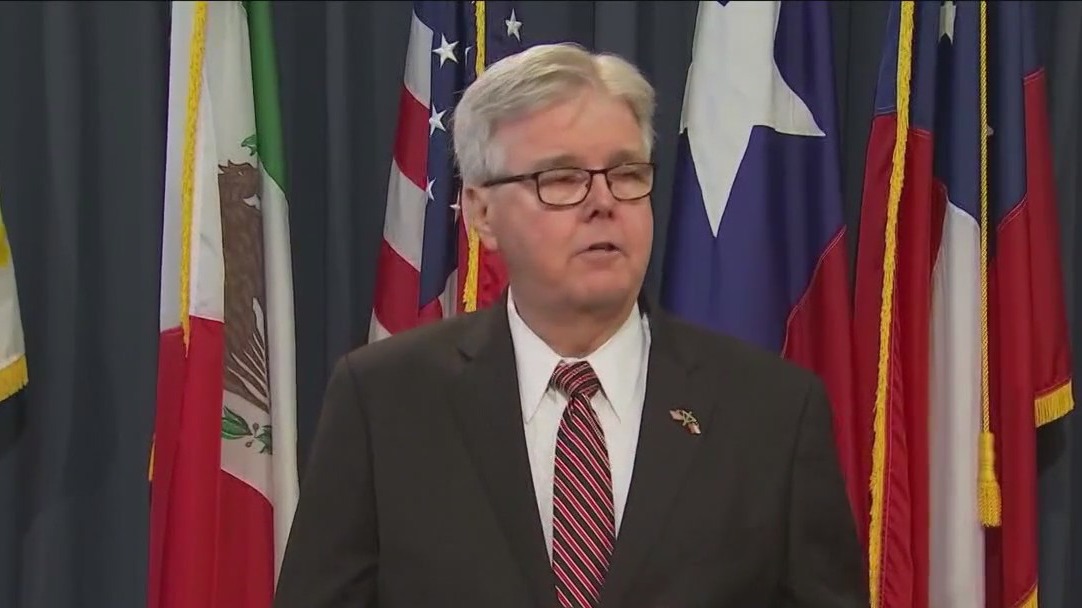Lt. Gov. Dan Patrick lays out top priorities for this year's legislative session

Lt. Gov. Dan Patrick lays out top priorities for this year's legislative session
Lieutenant Governor Dan Patrick is laying out his top priorities for this year's legislative session. His agenda touches on several economic and social issues.
AUSTIN, Texas - Lieutenant Governor Dan Patrick is laying out his top priorities for this year's legislative session.
His agenda touches on several economic and social issues. They include restoring voter fraud to a felony, property tax relief, improving the Texas grid and teacher pay raises.
Republicans control both the House and the Senate.
Katie Naranjo, chair of the Travis County Democratic Party, and Matt Mackowiak, chair of the Travis County GOP, joined FOX 7 Austin's Mike Warren to discuss.
MIKE WARREN: Matt, Dan Patrick believes Texans largely support his proposals because they support the conservative majority of Texans. But how does he convince liberals that his agenda is the right path forward?
MATT MACKOWIAK: Let's start with two data points. The first is that he won an overwhelming victory running on this agenda over the last year, running for reelection across the state of Texas to won by ten or 12 points on a statewide basis. So I think that's first, he's shown he can win not just Republican votes, independent votes, and even some conservative Democratic votes across the state. I think the second is that, you know, I would say 80 or 85% of all bills that have passed the Senate since he's Montana governor have done so on a bipartisan basis. So if you just look at his track record alone, he's he's attracted Democratic votes from Senate Democrats on a lot of issues, not on every issue. Clearly, there are divides between the Republicans and the Democrats. Look, I hope the Democrats will join with Senate Republicans in Texas to cut property taxes. It's high time that we do that. I hope that we do have a 10-year mandatory minimum jail term for someone who uses a gun in a crime. I think we need to improve our grid. And adding natural gas is a great way to do that. So I think this agenda has broad support and I think you'll see that in the Senate.
MIKE WARREN: Katie, is there a danger that Dan Patrick policies are going to alienate younger voters in Texas?
KATIE NARANJO: That's the trend that we've seen. Actually, the winner when it came to the lieutenant governor's race and the governor's race was not voting. The majority of Texans did not vote in this last election, general election. And so this is not this agenda that the governor, lieutenant governor has does not represent the majority of Texans wishes. In fact, what we're seeing is Matt's right. I'm so glad we're talking about infrastructure finally in the state of Texas. Broadband, the grid. It was because Democrats were on the ground campaigning on these issues year round to fix the damn grid. And that's what we need to do. It's not just natural gas, but it's actually what's going to make sure that we protect users of electricity across the state of Texas, open access to basic infrastructure like broadband, give a pay raise to our teachers. What I hope that the Texas Senate and Texas House do this session is focus on policies that will affect the bottom lines of individual Texans. Property tax relief, sure, but property tax relief benefits the wealthy the most. And so what we do need to look at is teacher pay raises supporting our health care workers and pay raises for them, making sure that our first line responders, law enforcement, are given the priorities they need as well.
MIKE WARREN: So it looks like there could be some agreement. But Matt Mackowiak, you know, why do Republicans seem to be really pushing school choice and parental rights this session? Any specific reasons for that?
MATT MACKOWIAK: Well, we've just gone through three years where so-called experts shut down our schools and kept our children down and held them back at a time when there was really almost no risk to any children under the age of 12 across the country. And so what you saw as you saw significant declining enrollment in public schools, as people went to charters and went to parochial schools, private schools, home schools, pods, etc. The parents are seeing that those options may be better fit. But look, we want the dollars to follow the child. They don't need to fund systems. They don't need to fund buildings. They certainly don't need to fund teachers, union executives with significant salaries. And so they need to follow the child where the child gets educated. And that choice should be made by a parent.
MIKE WARREN: Okay, Katie, last word real quick.
KATIE NARANJO: I didn't peg Matt for being a pandemic denier. We listen to health care professionals in the state of Texas. Local, popularly elected school boards set education policy, including masks. What the lieutenant governor is looking to do is to ban books, take away the rights of parents to make decisions in the home as to what's best for the child and to continue to force Texas women to have unfunded pregnancies in this state. It's a dangerous and slippery slope that's going to harm the public.

